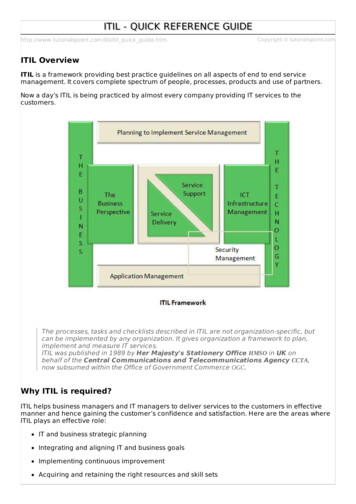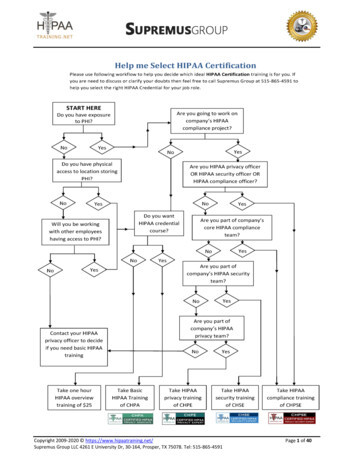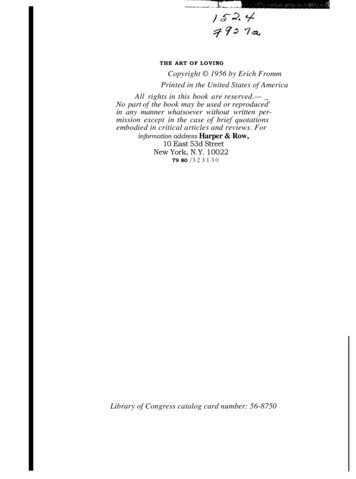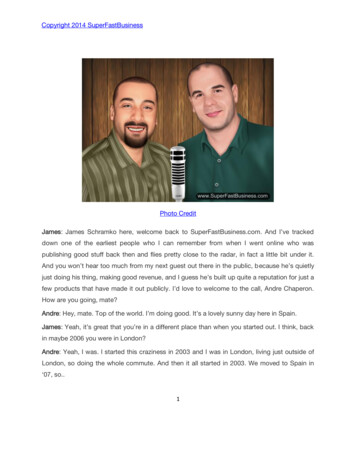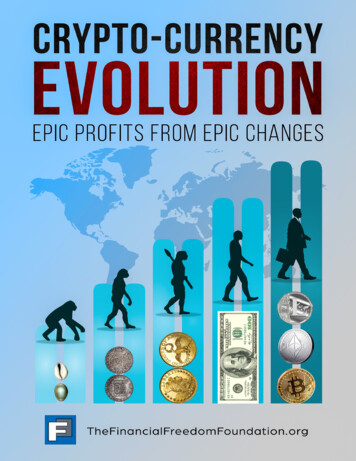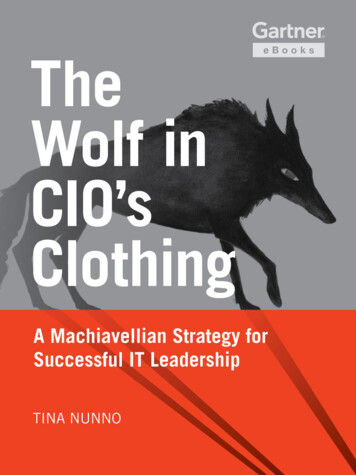
Transcription
Copyright 2013 Gartner, Inc.All rights reserved. No part of the book may be reproduced in any form by any electronic ormechanical means (including photocopying, recording, or information storage and retrieval)without permission in writing from Gartner, Inc., 56 Top Gallant Road, Stamford, CT 06904.ISBN: 2
Are you a Wolf CIO?As you read this book, consider your own approach to the three Machiavellian disciplines: Power,Manipulation and Warfare. Are you more comfortable on the light or dark side?Take the Wolf CIO quiz and find out.Are you a Wolf CIO?3
DedicationThis book is dedicated to my husband Frank. Throughout my travels many people have wonderedaloud about what kind of a man would be married to a woman like me. Fortunately for me, the answeris an amazing man who has a great sense of humor, which he needs to deal with me, and who isalways supportive of my endeavors, no matter how absurd they are. Without you, this book would nothave been possible.Dedication4
ContentsIntroduction61: Aspire to Be the Machiavellian Wolf CIO82: Master the Three Essential Machiavellian Wolf Disciplines: Power, Manipulation and WarfareSection I Power13193: Recognize the Power You Have and Increase It Exponentially204: Prioritize With Force and Finesse255: Exude Power by Growling, Rather Than Roaring, Your Reputation296: Make Sure No One Is Always in Control but You327: Follow the Money but Don’t Let It Fool You358: Recognize Stronger Wolves and Know When to Be a Lamb38Section II: Manipulation429: Employ Manipulation or Risk Being Manipulated4310: Treat Colleagues as Friends, but Assume They Are Enemies4811: Treat Information as a Weapon, and Don’t Load the Gun Aimed at You5112: Recognize That the Hero Is Often the Arsonist, So Don’t Feed the Fire5413: Ruthlessly Keep Others From Wasting IT’s Time5814: Combine the Wolf’s Power With Manipulation Tactics to Maximize Impact61Section III: Warfare6615: Master Multilateral Wars of Expansion to Grow the Enterprise and IT6716: Engage Lieutenants to Scale Up Your Power and Manipulation7217: Create Strong Alliances to Scale Up, but Select the Appropriate Methods7718: Fight on Multiple Fronts to Avoid Being Boxed in by the Enemy or Yourself8219: Create Weapons of Mass Destruction Through Force Multiplication86Today9020: Put One Paw in Front of the Other91Acknowledgements96About the Author97About Gartner98Contents5
IntroductionOne of the most controversial quotes I ever published in my research came from a successfulCIO who said, “I make it very clear to my colleagues that if they are not nice to me, they won’t getanything.” This straightforward statement created uproar among many other CIOs whose mostcommon retort has been, “They don’t need to be nice to me; they just need to respect me.” Itshocked me that senior IT executives could fail to understand that when colleagues are not nice tothem, it is a clear indication that they in fact do not respect them. Even those CIOs who understoodthis often were at a loss to correct negative behaviors toward IT when they occurred. This cementsIT’s role as a service provider rather than a strategic partner. It creates a cascade of problems for CIOsthat weaken their positions and makes it nearly impossible for them to thrive in their roles and help thebusiness compete.Why was this clear to me and to some CIOs but not to others? I discovered the reason wasthat the first CIO and I had read the work of Niccolo Machiavelli, a controversial 15th-century Italianphilosopher, and the others had not. Over the course of my career working with CIOs and otherexecutives, whenever I encountered particularly strong CIOs, I consistently asked what had inspiredthem and enabled them to grow their strength and effectiveness as a leader. A startling number ofthem had studied Machiavelli and practiced his teachings.I realized that Machiavellians are few in number in IT. Political and moral philosophy are notstandard reading in engineering, computer sciences or information management programs. Theyshould be, but until that happens, I hope to help fill the gap for the IT executives I have grown to careabout so much over the years. You see, while most IT executives are not very familiar with Machiavelli,most CEOs and their colleagues who have business degrees are, and they apply his tactics on adaily basis. Even those unfamiliar with Machiavelli are aware that the term Machiavellian has negativeconnotations and implies the use of subterfuge and aggression, as well as many other types of tactics.But since CIOs are frequently unaware of the nature of these sometimes-negative tactics, theycan fail to comprehend them at best, and at worst, are defenseless against them. The pressureon CIOs is massive and increasing as the demand for IT and opportunities to use technology forcompetitive advantage continue to expand. As a result, CIOs must not only familiarize themselveswith Machiavellian tactics as a defensive weapon, but also learn to use them as an offensive weaponin extreme situations so that they can exponentially increase IT’s contribution to their enterprises. LikeMachiavelli, I believe that positive management tactics are an excellent best practice, until that doesn’twork anymore. Then, leaders must be willing to try something else.So why do I feel so strongly about Machiavelli? The first reason is because I am genetically inclinedtoward his teachings and philosophies. I am first-generation Italian-American. I was raised on mymother’s stories about growing up in Italy when the culture dictated that anyone who insulted orharmed one of your family members would “just disappear” and no one would ask any questions. Iliked those stories a lot.When I grew up, my mother told me I was a lot like my grandfather, her father, who had passedaway when she was a little girl. He ran the large estate of the local duke and his family near Naples,managing the land and those who farmed it. Machiavelli by coincidence had served the family of thelocal duke in Florence centuries earlier. So whether my interest in leadership, conflict, politics andmorality was nature or nurture, it seemed that my path had been somewhat predetermined.Introduction6
As an undergraduate at university I became a history major. I was fascinated with human behaviorand what motivated people. History is filled with people we would consider good and people wewould consider bad, although the majority of us fall somewhere in between. It never occurred to me Iwould use any of my history education when I became an IT management analyst. Yet clients beganseeking me out when they found themselves in difficult political situations, in conflict with those whoappeared to have bad intentions or in other situations where the traditional management tactics theyhad been taught simply did not work. Soon, some clients started to refer to me as the “Mafia HitWoman Analyst.” I used to be a bit mortified by that but then I learned to embrace it — I do resemblethat remark and one must accept what one is.So I have dedicated much of my research to helping IT executives deal with conflict and masterchange. I have analyzed how behaviors and beliefs we have taken for granted in IT as truisms formany years are actually now weakening the ability of CIOs and our enterprises to succeed, particularlyin extreme situations. I have often referenced or interpreted Machiavelli for clients and applied hisphilosophies to the real and often extreme CIO situations of today. This book represents a collection ofsome of the most important lessons and messages from my body of work.For those of you who have not read the original works of Machiavelli, please do not be concerned.I will share with you what you need to know as we go through this journey. For those of you whoare familiar with Machiavelli, I hope you will find this a faithful application of his work, although I willnote that I took some liberties in the interpretation along the way. The most important of these is myselecting the Wolf to embody and represent the qualities of the ideal Machiavellian CIO, and creatingan “Extreme Animal Ecosystem” to illustrate many of his lessons. I choose to believe he would haveappreciated the liberties I have taken — he seemed to like thinking out of the box.This book contains many stories of CIOs who have participated in my research and graciouslyshared their painful situations, as well as their sometimes radical strategies for success. Other CIOstories represent amalgams of difficult situations that I have heard repeatedly over the years, alongwith strategies for dealing with them. For reasons that are likely obvious, all of the CIO stories areanonymous to protect both the innocent and the guilty. Some of these stories may resemble you. Ifthis is true, hopefully you will recognize that you are not alone, and that there is a light at the end of thetunnel even if the Machiavellian path you are about to embark on may be rather dark.Introduction7
1: Aspire to Be the Machiavellian Wolf CIOA prince then should know how to employ the nature of man, and that of the beastsas well It being necessary for a prince to know well how to employ the nature ofthe beasts,he should be able to assume both that of the fox and that of the lion; for whilst thelatter cannot escape the traps laid for him, the former cannot defend himself againstthe wolves.A prince should be a fox, to know the traps and snares; and a lion, to be ableto frighten the wolves; for those who simply hold to the nature of the lion do notunderstand their business.Machiavelli, The PrinceExtreme situations require animal inspirationMachiavelli advised that a leader should think like an animal because leaders are often embattled.Traditional management research advises that if CIOs follow appropriate processes, proceduresand methodology, they should not encounter serious problems. Unfortunately, this simply is nottrue. Reality demonstrates that CIOs are often challenged by the extraordinary rate of change in IT,increased expectations, and ever-growing demand in the face of shrinking revenue and resources.Often, the more extreme the expectations of are of IT in the enterprise, the more extreme the potentialconflicts for the CIO.Today’s CIO should aspire to be a Wolf. Machiavelli advised that leaders should take inspirationfrom two “beasts”: the fox to avoid the traps and the lion to scare away the wolves. But for CIOs theultimate animal is the Wolf — an ideal balance of an intelligent, social creature that can inspire loyalfollowership and create group affinity; and the ruthless predator that can lead a pack of strong fighters,win in a competitive environment and command a large territory.CIOs must display all of these qualities to lead highly complex IT organizations with an evolvingpurview as IT capabilities expand reach and range globally through information, mobility and socialmedia. The territory of the CIO is no longer the basement data center; it now has the potential to reachas far as the technology does. Yet as with the Roman Empire, with a greater territory to protect andmaintain comes greater risks.Consider the following scenario. A CIO’s colleagues complain: “We don’t get enough IT, or anyIT quickly enough, or cheaply enough, and why don’t we have some clouds, or really big data or adigital strategy, and why isn’t IT driving competitive advantage? I have a friend who told me he hasa CIO who does all of this for a fraction of the money that we are spending, and it’s all available ontheir tablets and smartphones. Why can’t the CIO simply do what we ask of IT when we ask it, orpreferably, before we think of it?”Sound familiar? When confronted with stakeholders who are unhappy with or critical of ITperformance, CIOs have traditionally relied upon reasonable arguments such as: IT is underfunded,understaffed, not included in strategic meetings or nonstrategic meetings for that matter, and how1: Aspire to Be the Machiavellian Wolf CIO8
can we possibly deliver something you didn’t ask for and did not know that you wanted until today?And no, it’s not possible for me to deliver stunning innovation and emerging technologies to you whenI’m busy putting out fires on my underfunded legacy systems while you are allowing other parts of theorganization to spend money like water on IT, then throw it over the wall for us to maintain, and wecan’t keep up. What? You want a new CIO? Didn’t you hear what I just said? Wait; let me explainit again Don’t bring data to a knife fightThe data-driven, empirical nature of CIOs is a tremendous strength. It helps them deal with thecomplex and detailed nature of IT, which is often difficult for colleagues in other business areas tocomprehend. It can be a strength when dealing with other colleagues who believe in data-driven,empirical decision making. Unfortunately, while many of us are fortunate that our stakeholders aredata-driven some of the time, few CIOs can say that their stakeholders are data-driven all of the time.Often, organizational politics accelerate and “rational” decision making is sacrificed in favor of basicsurvival instincts when enterprises are under stress from declining revenue, decreasing budgets orincreased competition. In these situations, data often simply doesn’t work.To be ready for any eventuality, a CIO must be a Wolf. Wolves are predators. Nothing in the animalkingdom eats a Wolf for food. Unfortunately, if you bring data to a knife fight, you are acting like preyand will risk ending up as food.What animal would you choose to describe yourself?The animal you choose might be a nice fluffy bunny rabbit. Rabbits are lovely creatures, and verylikable. Unfortunately, they are prey and almost every species in the animal kingdom can eat them. Theapproach many CIOs have taken to combat hostile stakeholders can best be described as, “CIOs arefriends, not food.” This approach is admirable. These CIOs aspire to b
Dedication 4 Dedication This book is dedicated to my husband Frank. Throughout my travels many people have wondered aloud about what kind of a man would be married to a woman like me.
